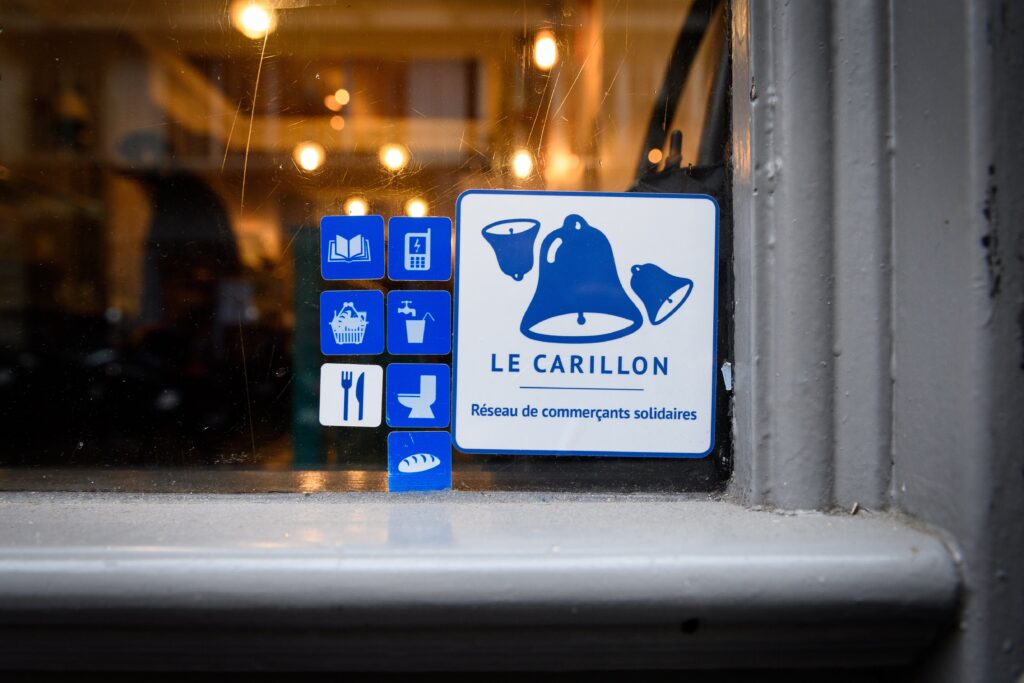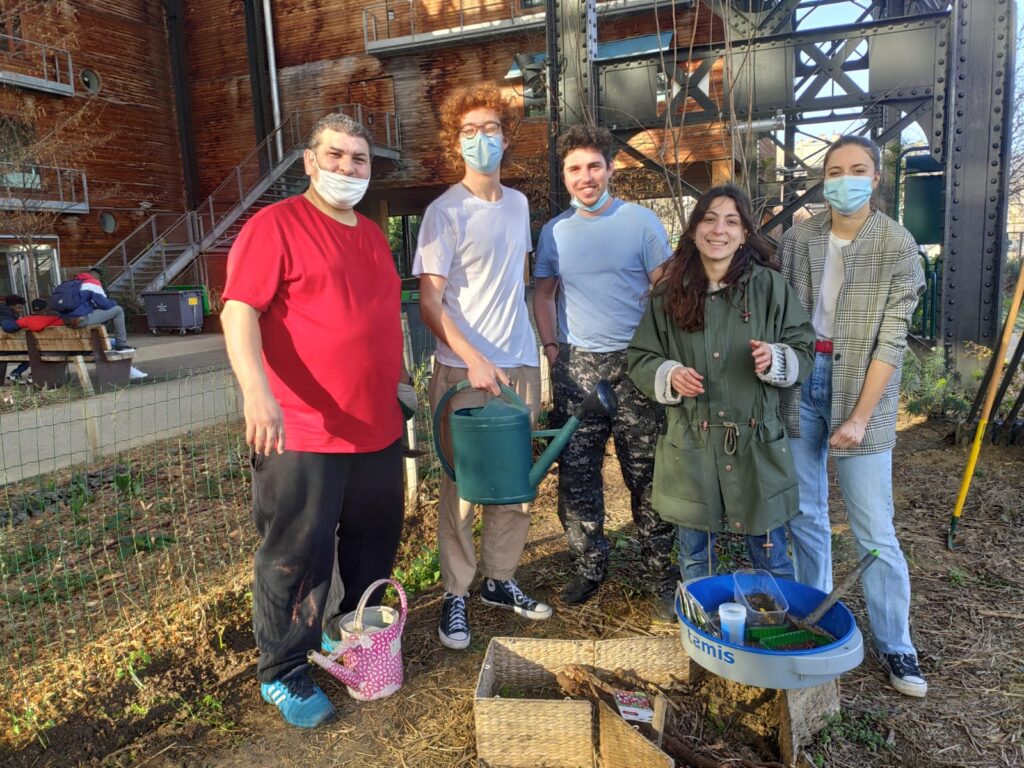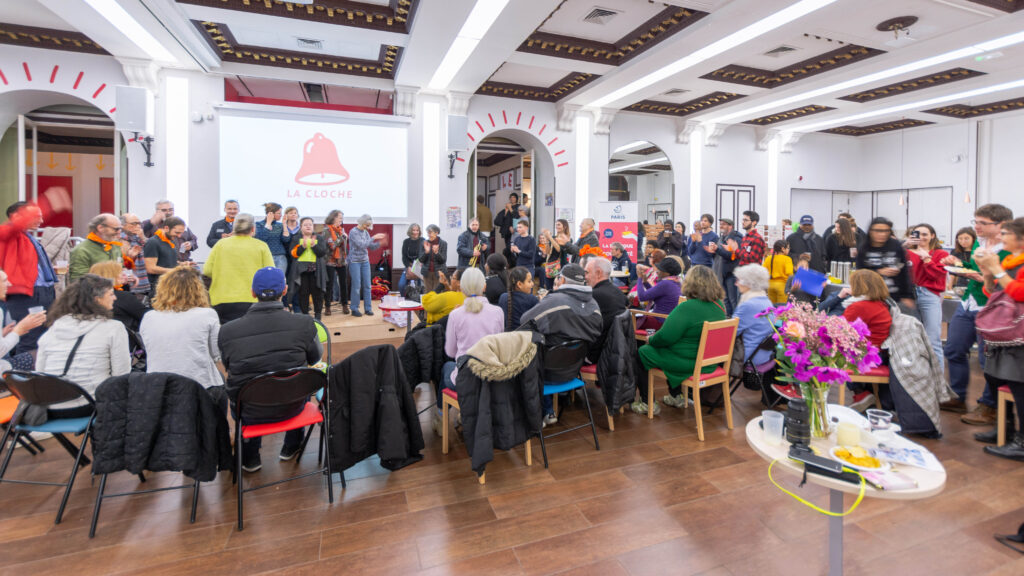LA CLOCHE, a not-for-profit association founded in 2014, works to change the way people view the world of the streets. It encourages people with and without homes to do things together to build a more inclusive society. Established in a number of major cities in France (Paris, Lille, Nantes, Lyon, Bordeaux and Marseille), LA CLOCHE is also the driving force behind the Chime network, which operates in seven countries (Belgium, Canada, the Czech Republic, France, Spain, the UK and the USA). Almayuda supports LA CLOCHE in its bid to replicate itself around France.
According to the figures compiled by the French National Institute of Statistics and Economic Studies (INSEE) and and specialized foundations, 300,000 homeless people in 2020 (50% more than in 2012!). Of these, 45% were women and 10% minors. These figures encompass a range of different situations, as a quarter of these people were in work and not all of them were living on the streets thanks to homeless shelters and emergency accommodation. The paradox lies in the fact that whereas 83% of homeless people say they suffer from rejection from passers-by, 94% of citizens state that they want to take action to combat the widespread exclusion (BVA/Emmaüs: Ticket for Change & Occurrence Study).
LA CLOCHE is the product of this evident contradiction and of beliefs shared with major associations working to tackle homelessness, among them the Collectif des Morts de la Rue, which states “when you are on the street, you do not die of hunger or cold but from isolation’; and the International Movement ATD Fourth World, which confirms this, saying, “social connection and a change in views are just as important as material assistance”.
Forging a bond between citizens

To establish connections, LA CLOCHE brought together citizens – the excluded and unexcluded alike – professionals working on the ground, beginning with shopkeepers and bar and restaurant owners, companies and the public authorities in order to run three programmes: Le Carillon, Les Clochettes and La Cloche à Biscuits.
Le Carillon is LA CLOCHE’s early initiative, its most significant and most readily replicated programme. It brings into direct contact two publics, often presented as opposed to each other: shopkeepers and bar and restaurant owners on the one hand and the homeless on the other. More than a thousand of the first group have signed up, in particular bar and restaurant owners, and demonstrate their support and membership of the programme by sticking up the programme’s logo with pictograms below it indicating the services they provide free of charge to the homeless: mobile phone charging, a glass of water, use of the toilets, use of the Wi-Fi service, printing or photocopying official documents, reheating food in the microwave, storage for personal belongings, etc.





Les Clochettes encompasses a multitude of urban, civic and green initiatives: shared gardens, urban farms, wall frescos, etc. Based on the same logic as Le Carillon, Les Clochettes offers a space open to all where manual activities provide an occasion for social connection. There are no prerequisites for taking part other than a wish to do something with others. The relationships that arise from joint efforts to better the appearance of the neighbourhood and to protect or improve the environment lead naturally to opportunities of all kinds such as jobs, accommodation and friendship.

La Cloche à Biscuits was founded in Paris and is part of the Dispositif Premières Heures system of financial support provided by the local authority for proposed activities suited to vulnerable and excluded people. Making ‘homemade’ biscuits within a responsible framework using organic ingredients enables participants to learn a trade, to acquire new skills and, for some, to reintegrate into the world of work. But it is also, and perhaps primarily, a space of inclusion and goodwill where, as one of the programme beneficiaries puts it, “I make biscuits with pleasure, but I also come here because it raises my spirits, because people smile…”
Mon taf Solidaire
La Cloche’s latest program was born in Marseille, where it has been based since 2017. “Mon Taf Solidaire” is a project aimed at gradually getting people in precarious situations back to work. The first “natural” employers are obviously the Carillon’s shopkeepers, mostly cafés and restaurants, but also bookshops, hairdressers and laundries. But the door is wide open to all others who have recruitment needs and wish to meet them by taking part in an action of social innovation and professional inclusion.
For employers, “Mon Taf Solidaire” offers a secure framework for risk-free testing of a person likely to encounter real career difficulties. It’s up to them to find the best assignments and develop them to their mutual advantage.
For people in precarious situations, far from employment, the aim is to test themselves in a benevolent professional environment, to regain self-confidence, to improve their skills, and to build social links through work.
Like all the projects run by LA CLOCHE, “Mon Taf Solidaire” is designed to be replicable, and to develop well beyond downtown Marseille.
Replication in France and abroad

As urban poverty knows no borders or limits, the model and programs initiated by LA CLOCHE are unfortunately destined to spread, adapting to local contexts. Starting in Paris, they are now being deployed in Lille, Nantes, Lyon, Bordeaux and Marseille. Other sites, either directly or through social franchising (with local associations), are planned for Dijon, Montpellier, Reims, Rouen, Tours, Nice…
Internationally, LA CLOCHE is the driving force behind “The Chime” network, which operates in Brussels, London, Madrid, Prague and Seattle, in a total of 18 cities in 7 different countries (figures for 2021). Although adapted to national and local circumstances, the general scheme is still based on donations and volunteer work, starting with the people directly concerned, many of whom are volunteers. Beyond borders, changing the way we look at things and acting together are shared objectives.
The last word to a “spokesperson” from the street: “When we’re all together, nobody knows who’s who, who has a home and who doesn’t.”
The last word must go to a person speaking on behalf of those on the street: “When you’re all together, nobody knows who’s who, who has a home and who doesn’t.”
Useful links

